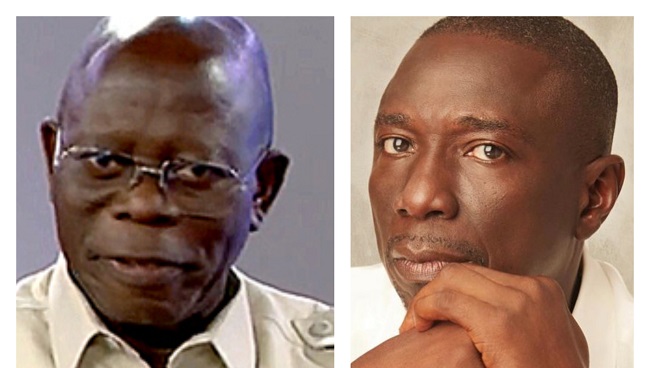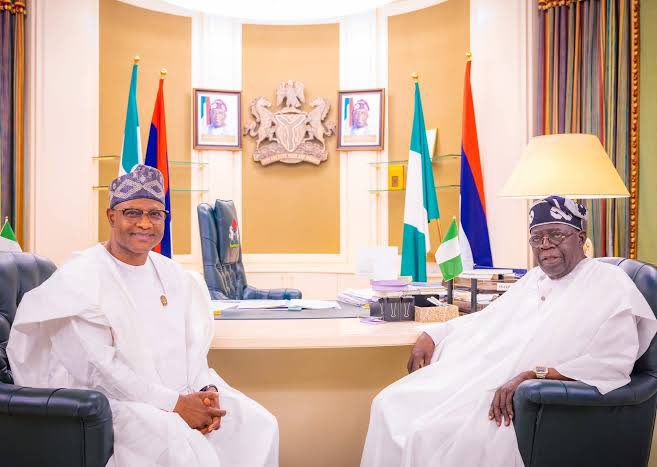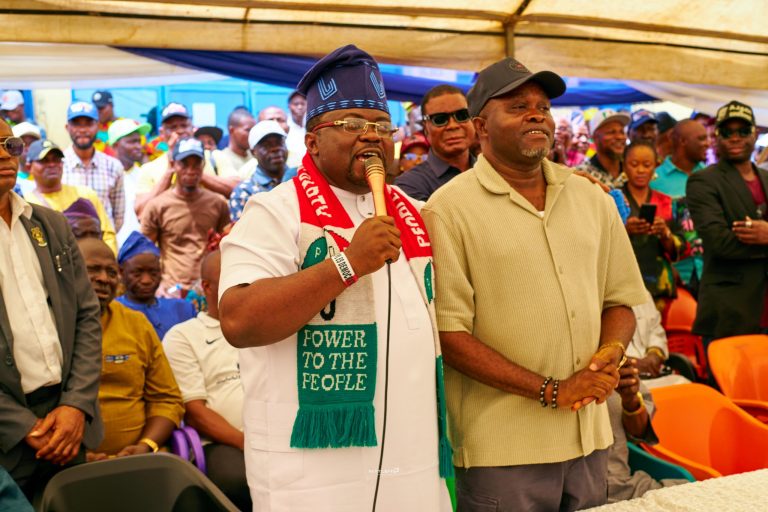Politics
Why Ighodalo Slammed ₦20 Billion Suit On Oshiomhole

Why Ighodalo Slammed ₦20 Billion Suit On Oshiomhole
The PDP candidate noted that the allegations by Oshiomhole are baseless, false, and malicious.
The candidate of the Peoples Democratic Party (PDP) for the September 21 governorship election in Edo State, Asue Ighodalo has filed a N20 billion defamatory suit against Senator Adams Oshiomhole over comments on Planwell scheme.
Ighodalo through his counsel, Ayo Asala (SAN) & Associates, also sought an immediate and unqualified retraction and apology for the false, defamatory, and malicious comments which should be published in at least two (2) National Television Networks and three (3) nationally circulating newspapers.
The PDP candidate noted that the allegations by Oshiomhole are baseless, false, and malicious, describing them as another of such defamatory fabrications and statements made by the Senator representing Edo North Senatorial District in the recent past.
He added that the fabrication of the unfounded and false story is a figment of Oshiomhole’s imagination intended to denigrate his good character and reputation for the political purpose of advancing the sinking fortunes of Oshiomhole’s party and candidate in the forthcoming gubernatorial election in Edo State.
A letter by Ighodalo’s lawyers dated September 16, 2024, and addressed to Oshiomhole reads, “We are counsel to Dr. Asue Ighodalo, who is the Governorship candidate of the Peoples Democratic Party in the forthcoming Edo State Governorship election.
“It is our information that at a campaign rally of your Party on Saturday, 14th of September, 2024, you made statements to the effect that our aforesaid client, Dr. Ighodalo, was associated with or participated in an alleged pyramid scheme known as ‘PLANWELL’ in which numerous Nigerians were defrauded of their hard-earned funds.
“This false and unfounded statement of yours was broadcast live on television and has received extensive exposure on electronic and social media.
“It is sad to note that despite your status as an elder and holder of a public office, you appear to have developed a pattern of spewing false statements in the public domain purely for the achievement of your political ends.
“This baseless, unfounded, false, and malicious allegation has become another in a long line of such defamatory fabrications and statements made by you in respect of our client in the recent past.
“Our client is an accomplished Nigerian legal practitioner and a corporate leader whose impressive resume from birth up till the current day is entirely in the public domain and our client has absolutely no connection with and could never have been involved in any manner whatsoever with the purported ‘PLANWELL’ scheme with which you have seriously defamed our client’s reputation.”
Ighodalo further noted, “It is clear that the fabrication of the unfounded and false story regarding the purported involvement of our client in the said ‘PLANWELL’ scheme or any other financial scheme whatsoever, is a figment of your imagination and a story fabricated purely for the purpose of denigrating the good character and reputation of our client for the achievement of the political purpose of advancing the sinking fortunes of your political party and candidate in the forthcoming Edo State Gubernatorial elections.”
He added: “Our client has been inundated with calls and other contacts from concerned members of the public who heard your said allegations on electronic and social media as a result of which our client has suffered enormous unwarranted reputational damage arising from the lies and baseless fabrications of which you have become the purveyor.
“Our client is determined to ensure that these defamatory lies and fabrications which you have put in the public space do not go unchallenged.”
He demanded, “In consequence of the foregoing, therefore, our client demands the following: i) An immediate and unqualified retraction and apology for your false, defamatory and malicious statements which should be published in at least two (2) National Television Networks and three (3) Nationally circulating newspapers.
“Pay to our client damages in the sum of 20 billion Naira for your false, defamatory, and malicious statements referred to herein.
“Take Notice that it is our client’s instructions that we immediately institute appropriate proceedings against you for damages in the sum of Twenty (20) Billion Naira (N20,000,000,000.00) for your said false, malicious, irresponsible and damaging statements made against our client without any foundation whatsoever in fact.”
“Further Take Notice that such action will be instituted without further notice or correspondence to you in that regard whatsoever,” it added.
Politics
Gov. Dauda Lawal commissions projects in Anka LGA, Commits to Sustainable Development

Gov. Dauda Lawal commissions projects in Anka LGA, Commits to Sustainable Development
The Executive Governor of Zamfara State, Dr. Dauda Lawal, has reiterated his administration’s steadfast commitment to guiding Zamfara State towards sustainable development by inaugurating and initiating a series of pivotal projects in the Anka Local Government Area.
Among the key undertakings announced are the comprehensive reconstruction and modernization of the Emir of Anka’s palace, signaling a revitalization of traditional leadership; the initiation of work on the crucial Anka–Abbare Road, which is expected to significantly improve connectivity; and the construction of a new Local Government Secretariat.
Additionally, the projects encompass the establishment of dedicated offices for the Hisbah Commission and the Community Protection Guards, alongside the reconstruction of the Safe School in Anka, emphasizing the administration’s focus on enhancing educational infrastructure.
During the commissioning event, Governor Lawal highlighted that these projects are a fulfillment of commitments made during his campaign, aimed at transforming the local landscape by improving infrastructure, stimulating economic growth, bolstering public service efficiency, and enhancing the capacities of security agencies. He called for a collective effort from the community to ensure proper maintenance of these facilities, underscoring the shared responsibility in preserving public assets.
Governor Lawal shared that similar projects have also been inaugurated in Tsafe, with plans for upcoming projects in Kaura Namoda, Moriki, Bungudu, Bukkuyum, and Zurmi, all expected to be completed and inaugurated by the year’s end. This ambitious timeline reflects the administration’s urgency in addressing the development needs of various regions within the state.
In his remarks, the governor urged residents and local traditional institutions to collaborate closely in maintaining the newly commissioned structures and supporting the overarching objectives of his administration. “I stand here in Anka today to honor our commitments to the people of Anka Local Government and all of Zamfara State. The official opening of the new palace for the ‘Sarkin Zamfaran Anka’ and the Zamfara State Council of Chiefs is a significant milestone that wraps up today’s agenda,” he stated.
Governor Lawal emphasized the strategic importance of the Anka–Abbare Road, describing it as a critical artery that will not only enhance access to remote areas but also stimulate economic activities and generate multiplier effects throughout the local economy. He articulated the necessity of providing a conducive work environment for civil servants, affirming that the new local government secretariat and dedicated offices will significantly contribute to strengthening law and order within the state.
“Education is the cornerstone of any thriving society. Our focused initiatives are oriented towards fostering a safe, secure, and supportive environment for our students. I am also proud to announce the completion and commissioning of the reconstructed SAFE School Anka today,” he remarked, reaffirming the administration’s dedication to education.
The governor further noted that the commissioning of the Emir’s Palace serves to restore the historical prominence of traditional institutions, which he regards as pivotal custodians of the region’s culture and heritage. He underlined the administration’s awareness of the invaluable role that these institutions play in fostering the state’s growth and emphasized the necessity of aligning development projects with cultural values.
In conclusion, the governor mentioned that after the successful commissioning in Anka and Tsafe, future projects in Kaura Namoda and Moriki will follow suit, while those in Bungudu, Bukkuyum, and Zurmi remain on track for completion and official commissioning before the year concludes.
news
GEN CHRISTOPHER GWABIN MUSA SUPPORT INITIATIVE HAILS GOVERNOR UBA SANI’S APPOINTMENT AS RENEWED HOPE AMBASSADOR

GEN CHRISTOPHER GWABIN MUSA SUPPORT INITIATIVE HAILS GOVERNOR UBA SANI’S APPOINTMENT AS RENEWED HOPE AMBASSADOR
The Gen Christopher Gwabin Musa Support Initiative (GCGMSI) has extended its warm congratulations to His Excellency, Mallam Uba Sani, the Executive Governor of Kaduna State, following his recent appointment as a Renewed Hope Ambassador and Deputy Director-General for Party Outreach, Engagement, and Mobilisation by the All Progressives Congress (APC).
This felicitation was formally conveyed in a statement signed by the Initiative’s Convener, Ibrahim Dahiru Danfulani, Sadaukin Garkuwan Keffi/Betara Biu, and disseminated to the press.
The statement highlighted that the Grand Patron of the GCGMSI, His Excellency General Christopher Gwabin Musa, OFR, Minister of Defence of the Federal Republic of Nigeria, received the news of the appointment with great pride but without surprise. According to the statement, General Musa expressed unwavering confidence in Governor Uba Sani’s proven capability and salient leadership qualities, affirming that the Governor is eminently equipped to deliver on every task entrusted to him.
The Grand Patron further extended profound appreciation to the President and Commander-in-Chief of the Armed Forces, His Excellency Asiwaju Bola Ahmed Tinubu, GCFR, for recognising and finding Governor Uba Sani worthy of this critical national assignment. The appointment, which takes effect immediately, was made by the President in his capacity as the leader of the APC, citing the Governor’s exceptional organisational abilities and strategic acumen.
In his new role, Governor Sani is tasked with working in close collaboration with the Director-General of the Renewed Hope Ambassadors and the party hierarchy, including the National Chairman of the APC. His primary mandate is to ensure harmony, inclusiveness, and strategic coordination across all levels of the party’s mobilization and engagement architecture, a vital function for advancing the political agenda.
Demonstrating its commitment to national service and effective governance, the GCGMSI, under the direct directive of its Grand Patron, General Musa, has officially mobilised its formidable structure. The Initiative has pledged the full deployment of its extensive network, seasoned personnel, and robust operational framework to assist and support Governor Uba Sani in the successful execution of his new responsibilities.
The Gen Christopher Gwabin Musa Support Initiative, renowned for its disciplined organisation, widespread grassroots penetration, and capacity for large-scale civic mobilisation, stands ready as a pivotal force. This move underscores the GCGMSI’s pivotal role as a key support system for national development initiatives and its unwavering dedication to fostering unity and progress under the Renewed Hope agenda.
Politics
Oyo 2027: Ajadi Says PDP Will Retain Power

Oyo 2027: Ajadi Says PDP Will Retain Power
…..Tasks PMS To Remain United, Peaceful
A leading People’s Democratic Party (PDP) governorship aspirant in Oyo State, Ambassador Olufemi Ajadi Oguntoyinbo, has urged the people of Oyo State to remain steadfast, saying they will continue to enjoy good governance because the PDP will produce the next governor in the 2027 general elections.
Ajadi, who made this known while addressing transport unions under the Park Management System (PMS) at their headquarters, New Garage, Ibadan, on Tuesday, urged the park managers to remain united and maintain the love and peace currently prevalent among them.
According to him, “My advice to the Park Managers and the commercial drivers in Oyo State is that they should continue the love and peaceful attitudes. They should remain united. They should not ‘scattelegs’.
“Don’t let anybody deceive you, remain steadfast. Let me assure you that our party, the PDP, will produce the next governor come 2027,” Ajadi said.
He said he came to the PMS headquarters to meet with transporters and park managers to inform them of his aspiration to serve the people of Oyo State as governor come 2027.
“Today I joined my people, the park managers in Oyo State, to familiarize myself with them and inform them of my intention to serve the people of Oyo State as the next governor by the Grace of God.”
On the plans for the transporters, Ajadi said he first wants to change the look of the City Cabs, which will be done in collaboration with the Park Management System.
He also plans to increase the number of Mass Transit buses and make them available in all locations of the State.
He said the Mass Transit buses will operate in partnership with the Park Managers.
Ajadi, who commended Governor Makinde on the newly established bus terminals in the State, said his government will ensure adequate usage of the facilities.age of the facilities.
-

 celebrity radar - gossips6 months ago
celebrity radar - gossips6 months agoWhy Babangida’s Hilltop Home Became Nigeria’s Political “Mecca”
-

 society6 months ago
society6 months agoPower is a Loan, Not a Possession: The Sacred Duty of Planting People
-

 news6 months ago
news6 months agoTHE APPOINTMENT OF WASIU AYINDE BY THE FEDERAL GOVERNMENT AS AN AMBASSADOR SOUNDS EMBARRASSING
-

 society5 months ago
society5 months agoReligion: Africa’s Oldest Weapon of Enslavement and the Forgotten Truth








